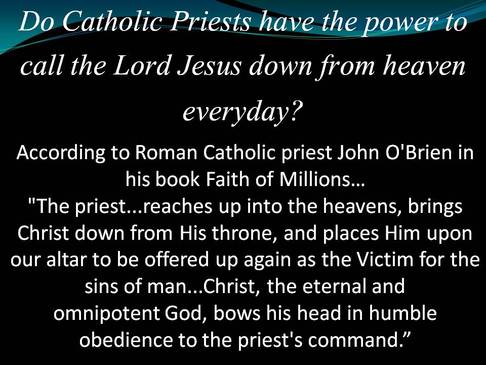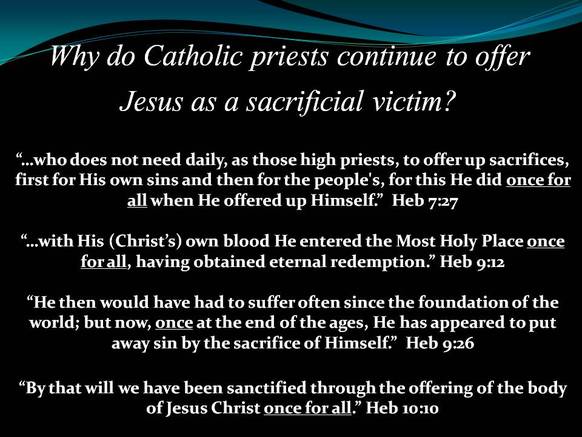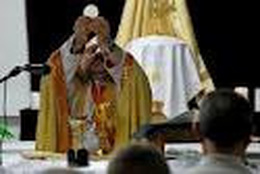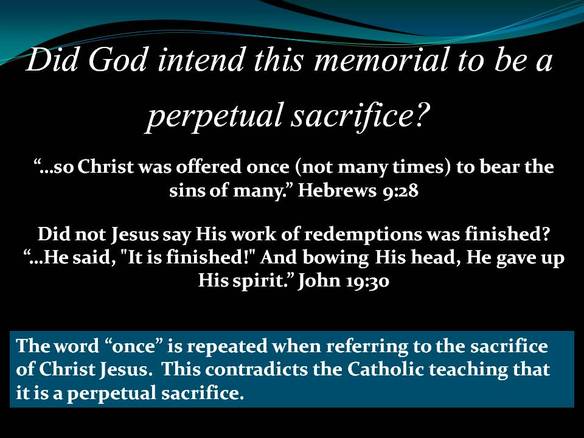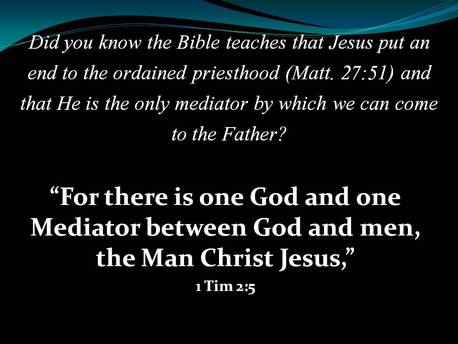Dear Catholic Friend . . .Is your faith in Christ and His Word
or is your faith in the religious traditions of man?
What Roman Catholicism Teaches About the Sacrifice of the Mass
All Catholics are obligated by the laws of their church to attend church every week:
"On Sundays and other holy days of obligation the faithful are bound to participate in the Mass" (paragraph 2180 of the Catechism of the Catholic Church).
Why is participation so compulsory for Catholics? The answers are found in the Catechism of the Catholic Church (CCC) and are noted by paragraph numbers in parenthesis. Lets first look to the Catechism to define the Mass and the Eucharist:
The Mass is...the sacrificial memorial in which the sacrifice of the cross is perpetuated (1382). The Eucharist is thus a sacrifice because it re-presents (makes present) the sacrifice of the cross...and because it applies its fruit...the forgiveness of the sins we daily commit. The sacrifice of Christ and the sacrifice of the Eucharist are one single sacrifice: The victim is one and the same. In this divine sacrifice which is celebrated in the Mass, the same Christ who offered himself once in a bloody manner on the alter of the cross is contained and is offered in an unbloody manner (1366,1367).
Catholics are given no choice but to believe these teachings. Is the Lord Jesus really physically present in the Eucharist? How Catholics answer this question has serious consequences. If they deny the presence of Jesus, they are condemned by their church.
Canon 1 of the Council of Trent:
If anyone denies, that in the sacrament of the most Holy Eucharist, are contained truly, really and substantially the body and blood together with the soul and divinity of our Lord Jesus Christ, and consequently the whole Christ...let him be anathema.
If they worship the Eucharist as the Lord Jesus, they commit the sin of idolatry. The Israelites worshiped a golden calf as their God. Those who committed this sin suffered the wrath of Almighty God (Ex. 32:1-28). Catholics are taught their redemption comes from the ongoing repetitious liturgy of the Mass and NOT from the perfect and finished sacrifice of Jesus on Calvary’s cross.
For it is in the liturgy, especially in the divine sacrifice of the Eucharist, that the work of our redemption is accomplished. Every time this mystery is celebrated, the work of our redemption is carried on (1068, 1405). In the liturgy of the Mass we express our faith in the real presence of Christ by genuflecting or bowing deeply as a sign of adoration of the Lord (1374, 1378). (How could redemption be accomplished AND carried on?)
The Church knows that the Lord comes even now in his Eucharist and that he is there in our midst (1404).
Clearly the Catholic Church teaches the Lord Jesus Christ returns to the earth every day to be worshiped and sacrificed. Over 200,000 times each day, on Catholic altars throughout the world, priests believe they re-present Jesus as a sacrificial victim for sins. The Catholic priest is said to have the power to call almighty God down from heaven and then continue to do what the Lord Jesus declared He finished 2000 years ago. The Lord Jesus endured excruciating pain and torture for sinners once for all. What is the point of repeating this? It is unthinkable that Catholics would want to continue His suffering on their altars. Not only does Rome purport to continue this horrific sacrifice with Jesus as its “victim”; it dares to say this sacrifice has power to forgive sin:
The Eucharist is also offered in reparation for the sins of the living and the dead and to obtain spiritual or temporal benefits from God. Holy Communion separates us from sin. I should always receive it, so that it may always forgive my sins. Because I always sin, I should always have a remedy (1393, 1414).
"On Sundays and other holy days of obligation the faithful are bound to participate in the Mass" (paragraph 2180 of the Catechism of the Catholic Church).
Why is participation so compulsory for Catholics? The answers are found in the Catechism of the Catholic Church (CCC) and are noted by paragraph numbers in parenthesis. Lets first look to the Catechism to define the Mass and the Eucharist:
The Mass is...the sacrificial memorial in which the sacrifice of the cross is perpetuated (1382). The Eucharist is thus a sacrifice because it re-presents (makes present) the sacrifice of the cross...and because it applies its fruit...the forgiveness of the sins we daily commit. The sacrifice of Christ and the sacrifice of the Eucharist are one single sacrifice: The victim is one and the same. In this divine sacrifice which is celebrated in the Mass, the same Christ who offered himself once in a bloody manner on the alter of the cross is contained and is offered in an unbloody manner (1366,1367).
Catholics are given no choice but to believe these teachings. Is the Lord Jesus really physically present in the Eucharist? How Catholics answer this question has serious consequences. If they deny the presence of Jesus, they are condemned by their church.
Canon 1 of the Council of Trent:
If anyone denies, that in the sacrament of the most Holy Eucharist, are contained truly, really and substantially the body and blood together with the soul and divinity of our Lord Jesus Christ, and consequently the whole Christ...let him be anathema.
If they worship the Eucharist as the Lord Jesus, they commit the sin of idolatry. The Israelites worshiped a golden calf as their God. Those who committed this sin suffered the wrath of Almighty God (Ex. 32:1-28). Catholics are taught their redemption comes from the ongoing repetitious liturgy of the Mass and NOT from the perfect and finished sacrifice of Jesus on Calvary’s cross.
For it is in the liturgy, especially in the divine sacrifice of the Eucharist, that the work of our redemption is accomplished. Every time this mystery is celebrated, the work of our redemption is carried on (1068, 1405). In the liturgy of the Mass we express our faith in the real presence of Christ by genuflecting or bowing deeply as a sign of adoration of the Lord (1374, 1378). (How could redemption be accomplished AND carried on?)
The Church knows that the Lord comes even now in his Eucharist and that he is there in our midst (1404).
Clearly the Catholic Church teaches the Lord Jesus Christ returns to the earth every day to be worshiped and sacrificed. Over 200,000 times each day, on Catholic altars throughout the world, priests believe they re-present Jesus as a sacrificial victim for sins. The Catholic priest is said to have the power to call almighty God down from heaven and then continue to do what the Lord Jesus declared He finished 2000 years ago. The Lord Jesus endured excruciating pain and torture for sinners once for all. What is the point of repeating this? It is unthinkable that Catholics would want to continue His suffering on their altars. Not only does Rome purport to continue this horrific sacrifice with Jesus as its “victim”; it dares to say this sacrifice has power to forgive sin:
The Eucharist is also offered in reparation for the sins of the living and the dead and to obtain spiritual or temporal benefits from God. Holy Communion separates us from sin. I should always receive it, so that it may always forgive my sins. Because I always sin, I should always have a remedy (1393, 1414).
HOW MANY TIMES CAN JESUS DIE FOR SINS?
One would have to reject the clear teaching of the Bible to believe that the sacrifice is perpetual. Believing the sacrifice is perpetual is the same as telling the Father that His sinless Son's sacrifice was not good enough. Again, notice the word "once" repeated several times when referring to Christ's sacrifice. The Catholic Mass blatantly denies the sufficiency of Christ’s atonement that is so clearly stated in Scripture. The Bible is clear in teaching that Christ’s atonement is finished. Did not Jesus say it was finished? “…He said, "It is finished!" And bowing His head, He gave up His spirit.” John 19:30
Also Consider the Following
1. Jesus was never a victim as Rome says. He offered Himself as a willing and obedient sacrifice. The word of the Lord proclaims: “And being found in appearance as a man, He humbled Himself and became obedient to the point of death, even the death of the cross.” (Phil 2:8 NKJV)
2. When Jesus said we must eat His flesh and drink His blood, His words were spiritual and not to be taken literally. “It is the Spirit who gives life; the flesh profits nothing. The words that I speak to you are spirit, and they are life.” (John 6:63 NKJV). He was using figurative language, as He often did (John 16:25 NKJV).
3. Those who take eating and drinking literally are must become cannibals to gain eternal life. In addition, consuming blood was forbidden by God (Leviticus 17:10-14). Jesus would not have asked Jews to break the law.
4. The alleged change of bread and wine into flesh and blood is not a miracle, but a hoax because there is no change in appearance, substance, and taste. True biblical miracles were real and observable.
5. Rome says the Mass is a bloodless sacrifice, but a sacrifice without blood cannot atone for sins (Lev 17:11, Heb 9:22). Jesus instituted the Lord’s Supper as a memorial not a sacrifice. (Luke 22:19, 1 Cor. 11:24).
6. Nowhere in the New Testament do we find priests offering sacrifices for sin or Masses for the dead. Catholic priests violate Christ’s unique role as mediator between God and men. (1 Tim 2:5)
7. To worship the elements of the Mass is to commit the sin of idolatry (Exod. 20:4-5).
Conclusion: To participate in the Eucharist IS a rejection of the finished work of Christ. Therefore, it does not leave a person forgiven, but still dead in sins and guilty before God on judgment day.
"Thus you have made the commandment of God of no effect by your tradition."
Jesus Christ (Matthew 15:6)
How then can I be good enough to go to heaven and be truly forgiven for my sins?
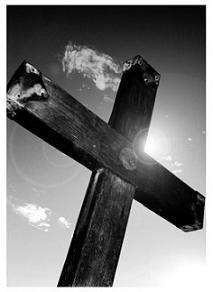
Click the cross to see how you will do on judgment day and if you are good enough to enter His kingdom...
